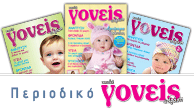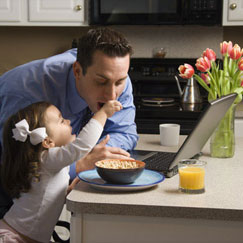Spoiled babies are happy babies!

Follow your maternal instinct and offer your baby love, care and many many hugs, without the stress of not knowing it!
He wakes up in the middle of the night tearing up because he's hungry or just because he wants you next to him. He cries when you walk away from him and opens his arms to hug him. He whines when you don't pay attention to him and distracts you by squealing or throwing his toys. He demands his food on time and "fights" you when you are late. Your parents, in-laws and possibly your friends and acquaintances are vertical: you are raising a spoiled baby and you will do well to stop dealing with him every time he screams "a"! You try to balance between endless love and learning the boundaries and rules of the baby. You feel remorse when you take it with you to bed, you feel bad when you are "indifferent" to his crying, when you leave and you let him cry until he calms down on his own. Fatigue, guilt, nerves, frustration and finally the result that comes out of yourself and ranks you among the "incompetent" manoles. Calm down! There is no greater myth than the one who wants babies to become ill-educated when we respond immediately to their cries and satisfy their "wants". There are no spoiled babies, on the contrary there are unhappy babies who are deprived of their mother's love and care because they simply do not have to learn well.
<<Let it cry!>>
How many times have we not heard this! Following the legendary "crying is good for the baby's lungs" to the creepy "she will cry and get bored at some point" many moms have found themselves in the awkward position of listening to their babies bursting into tears and doing nothing. Your baby's crying is nothing more than the only way he knows how to communicate with you. But above all, his crying is a call to tell him that "everything is fine, mom is here and she will take care of you as much as you want". Many mothers have noticed that especially in the midnight "repertoire" of crying, their baby did not want to eat, nor change sides, nor change diapers, but only a hug on their chest, a few caresses and the reassuring voice of his mother. that everything is fine. Can you deny your child the feeling of calm and security just so he doesn't get hurt?
The “attachment parenting” theory
Dr. Sears is considered one of the most renowned scientists. A pediatrician and father of eight, Dr Bill, as his young patients call him, has written more than 30 books on child rearing, all with one thing in common: the supremacy of mom's love, care and embrace. against any other "trick" of upbringing. The mother responds immediately and instinctively to every call of her child, without having in the back of her mind "anxieties" such as "is the baby using me now?" "Am I learning this badly now?" Is called "attachment parenting" and is nothing more than the very natural need of the mother herself to meet her baby's needs, as they are expressed by crying or voice. The mother-infant bond is a relationship that is built daily and is based on caring for, loving and unconditionally satisfying the baby's needs. It is a relationship based on harmony and creates security in the baby, who knows that whatever is needed, from something serious (eg pain) to something "insignificant" (eg mood for play and kissing) his mom will be always there.
Benefits for your baby!

When a baby feels good, it does the right thing. He learns to give and receive love, he understands the needs of others, since it is very easy for him to learn that just as he satisfies his needs so the rest must satisfy his own, he becomes independent and not isolated, he feels safe and how he can rely on the people he loves. But most of all, "attachment parenting" ... is responsible for creating a calm, smiling family, but also for building a wonderful relationship with your baby, which will continue to exist even in the difficult years of adolescence. No one has ever suffered from love, affection and attention. Give your baby the opportunity to grow up confident that you are not indifferent to his needs and that for whatever is needed, his mom will be there to take care of him. Put yourself in his shoes for a moment and imagine yourself in an environment full of expected stimuli, images and conquests. What is certain is that in this storm of new things and changes that happen every day, you will also seek a consolation in a loving caress, a look of love, a smile that will tell you that everything is famous, let alone your baby.
Be proactive!
Are there ways to relieve your baby or prevent him from crying?
- The tactic of "everything is fine". Suppose while playing with your baby the phone rings and you have to talk. The baby starts looking for you, upsetting you. Smile at him and talk to him saying "don't worry my love, I'll talk for a while and I'll come", while as long as your conversation lasts, caress him or turn your face to his side and let him watch you.
- Prevent the crying. Use your humor and acting skills to catch up before the cry starets. Make funny faces at it, send it hugs, dance for a while and then hug and dance together.
- Explain to it what you are doing and why you should move away from him/her.
- Sleep with it in special cases. If your baby has a fever or a toothache or just can't sleep, go to bed with him. Let him put his face on your chest, smell you, play with your nightgown or pyjamas and brag about it as he will be sweetly asleep.
- "Wear" your baby. Take a walk with it in your purse or sling. The sound of your heart will calm him down and make him enjoy his walk much more, while increasing your bond with him even more.
- Talk to it all the time! Ask him what it did while you're away, reward him for eating all his food, tell him he doesn't mind crying and caress him with understanding. And finally, understand that children are not the little blackmailers we think they are. They are small creatures with needs, seeking satisfaction.
Did you know?
In the 1970s, researchers Sylvia Bell and Mary Ainsworth divided a group of women and their children into two groups.
The mothers in group 1 responded immediately to their baby's cries, with kisses, caresses and breastfeeding.
The mothers of group 2 did not respond for a long time to their child's call.
The result; The babies in group 1, as soon as they closed the first year of their lives, stopped using crying as a means of communication and with several words, which became more and more complicated as time went on, they tried to tell their mom what they were doing. they wanted, while the babies of group 2 insisted with constant and prolonged crying to "gain" the attention of their mommy.




















